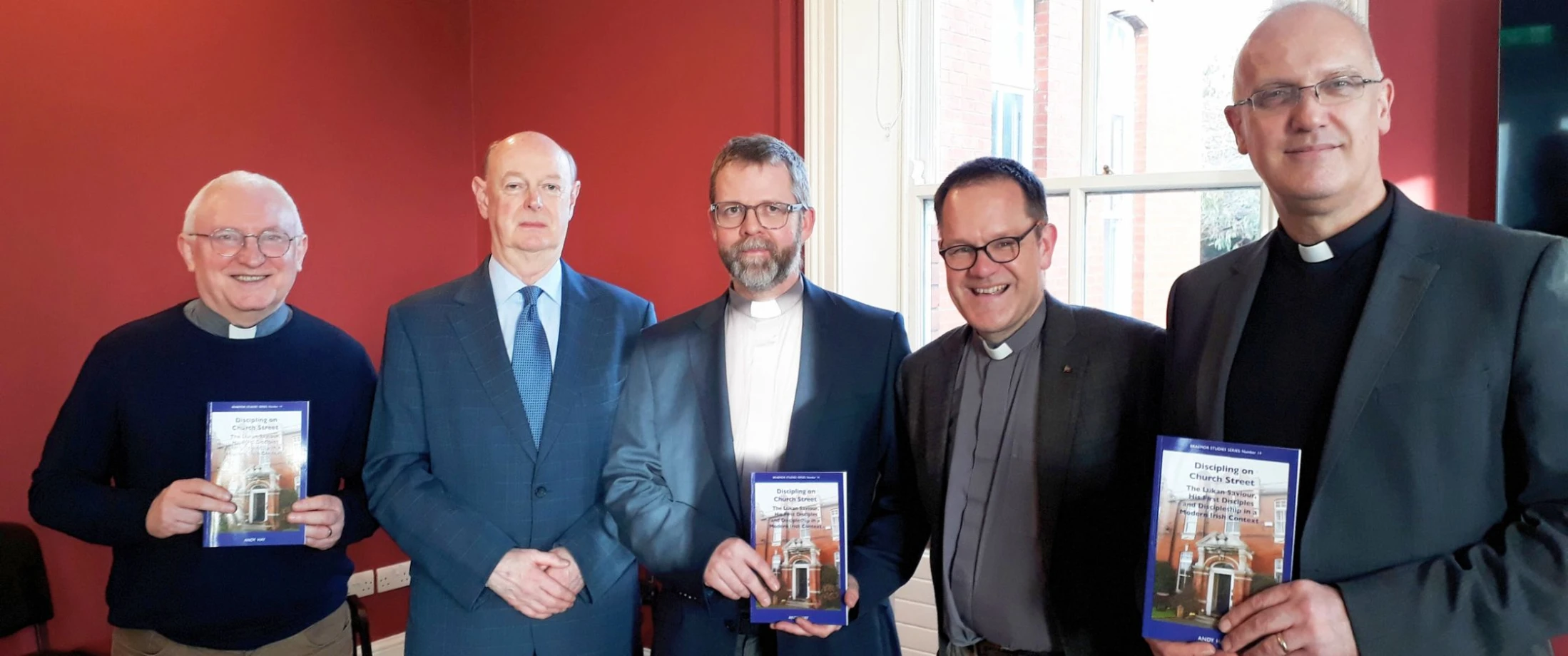New Braemor Study, ‘Discipling on Church Street’
The recent launch of Discipling on Church Street: The Lukan Saviour, His First Disciples and Discipleship in a Modern Irish Context, marks ten years of the Braemor Studies, a series of the best dissertations from MTh students of the Church of Ireland Theological Institute.
This latest and 14th study was written by the Revd Andy Hay, who currently serves as curate at St Finnian’s, Cregagh, in the Diocese of Down and Dromore.
Discipling on Church Street considers what it means to be a disciple of Jesus, by looking at the writings of Luke in the Gospel which carries his name, and the Acts of Apostles. It begins with Jesus’ announcement of his work (Luke 4:16–17) – a “jubilee’ task” setting the context for the Saviour’s words and deeds and those of his first disciples – “freedom for the oppressed, good news for the prisoners, opening of sight for the blind.” The idea of jubilee links back to principles of freedom and release set out in the law given to Israel in the Old Testament.
Through informal interviews with a range of local church leaders in Belfast, this dissertation seeks to understand how discipleship is understood today and to compare this with discipleship as it is set out in Luke and Acts. Introducing the book, Mr Hay noted that salvation appears six times, and Saviour twice in Luke’s Gospel compared to once each in John’s Gospel and no references in the Gospels of Matthew or Mark.
“This led me to explore Luke’s idea of Jesus the Master as primarily Saviour. Luke uses those words for a reason,” he remarked. Jesus himself used the word salvation in Luke’s Gospel, in his encounter with Zacchaeus, whose “turnaround in repentance” decreased his status and wealth while that of the community around him “is now being lifted and there’s an equalling.”
Just before this happened, Jesus had asked a blind man calling out for mercy to come forward; the opening of his physical eyes led to praise for God by him and “in the crowds that until that moment had been shunning him.” Salvation is ultimately seen in the Cross through which Jesus redeems the world. In Acts, we see disciples “praying for and bringing healing to people … proclaiming the name of their Master … reordering society in a way that is much more fair.” How discipleship is lived out will vary according to circumstances in each local context but “there will be people where we live who are downtrodden, who are oppressed, and with eyes on our Master we look to what they need.”
One of the most important themes taken up in the study is that discipleship involves suffering. “This will cost,” he continued. “It cost Zacchaeus, it cost Stephen, it cost Jesus, and it will cost us so that’s something we would look to take seriously as disciples as we understand Luke–Acts as best as we can and we primarily look to our Master.”
Mr Hay thanked the Revd Dr Paddy McGlinchey, his dissertation supervisor, for his “incredibly diligent” guidance and the other lecturers at CITI, Dr Katie Heffelfinger, Dr Bridget Nichols and Canon Dr Maurice Elliott for informing the dissertation through their classes and conversations. Mr Hay also acknowledged Church of Ireland Publishing and his rector, Canon Jonathan Pierce, for his kind words of introduction.
Discipling on Church Street is on sale for £5.00/€6.00 from the Church of Ireland’s online bookstore: store.ireland.anglican.org
Pictured above, L–R: Revd Dr Paddy McGlinchey, Dr Raymond Refaussé (Church of Ireland Publishing), Revd Andy Hay, Canon Jonathan Pierce, and Canon Dr Maurice Elliott.
